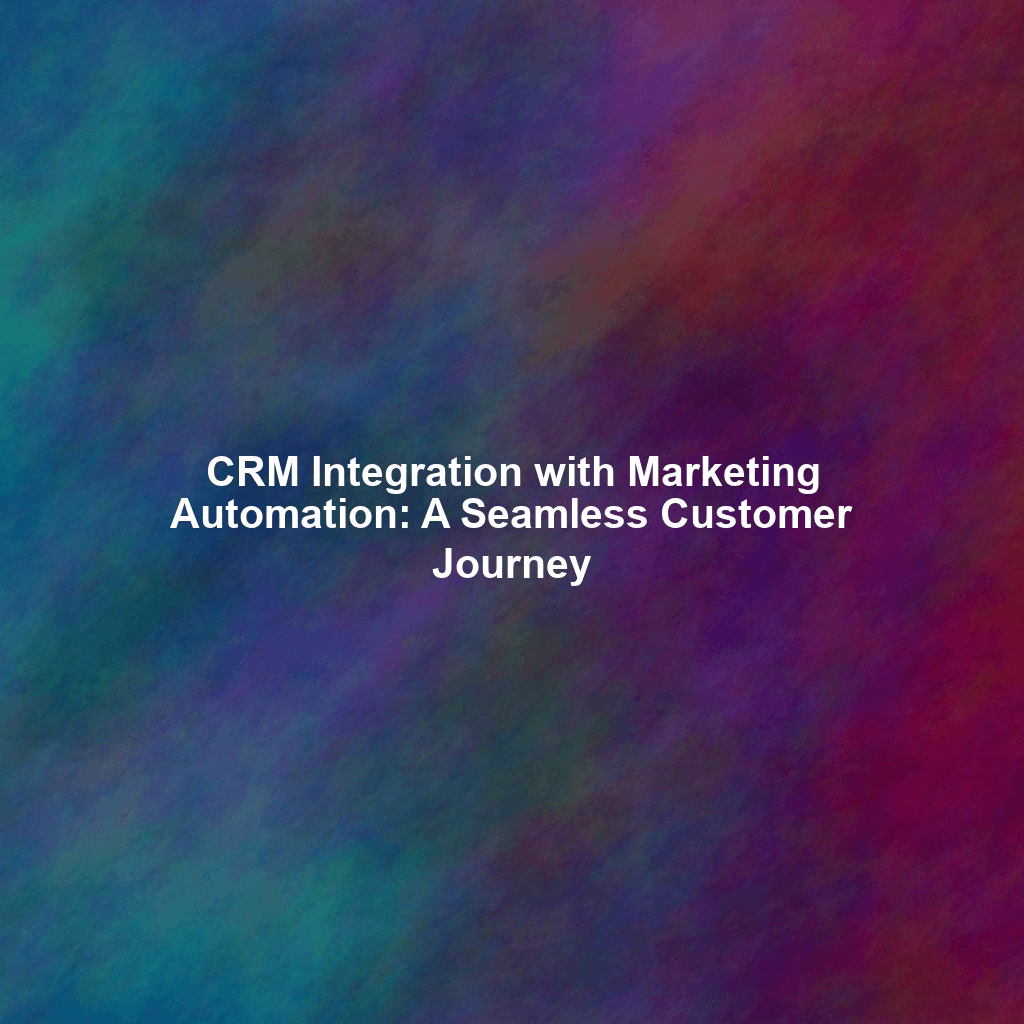The Power of Unified Customer Data
Before integration, your CRM and marketing automation systems likely operate in silos, holding valuable customer data that isn’t shared. This lack of communication leads to fragmented customer views, inconsistent messaging, and missed opportunities. Integrating these systems breaks down these walls and unlocks a wealth of potential.
Improved Data Accuracy and Consistency
By integrating CRM and marketing automation, you create a single source of truth for customer data. This eliminates discrepancies, reduces errors, and ensures everyone in your organization is working with the most up-to-date information. Think about it: marketing receives immediate updates on sales interactions, and sales benefits from real-time insights into marketing engagement.
Enhanced Customer Segmentation
With unified data, you can create more sophisticated and accurate customer segments. This allows you to target specific groups with personalized messaging and offers, increasing engagement and conversion rates. For example, you can segment customers based on their purchase history, website activity, email interactions, and demographics.
Supercharging Lead Nurturing Efforts
Lead nurturing is the process of building relationships with potential customers, guiding them through the sales funnel, and ultimately converting them into paying customers. Integrating your CRM and marketing automation systems significantly enhances your lead nurturing capabilities.
Automated Lead Scoring and Qualification
Marketing automation can track lead behavior, such as website visits, email opens, and form submissions. This data is then used to score leads based on their engagement level and likelihood to convert. Qualified leads are automatically passed to sales, ensuring your team focuses on the most promising prospects. CRM integration provides valuable historical context to this lead scoring, making it even more accurate and effective.
Personalized Email Marketing Campaigns
With access to customer data from your CRM, you can create highly personalized email marketing campaigns that resonate with your audience. Imagine sending emails that address customers by name, reference their past purchases, and offer tailored recommendations. This level of personalization significantly increases engagement and drives conversions.
Triggered Campaigns Based on Customer Behavior
Integrating your CRM and marketing automation allows you to set up triggered campaigns based on specific customer actions. For example, if a customer abandons their shopping cart, you can automatically send them a reminder email with a special offer. These timely and relevant messages can significantly improve sales conversion rates.
Elevating the Customer Experience
In today’s customer-centric world, delivering exceptional customer experiences is crucial for success. Integrating CRM and marketing automation can help you create seamless and personalized interactions at every touchpoint.
Consistent Messaging Across Channels
By sharing customer data between your CRM and marketing automation systems, you can ensure consistent messaging across all channels, including email, social media, and your website. This creates a cohesive brand experience and reinforces your company’s message.
Personalized Website Experiences
With access to customer data, you can personalize the website experience for each visitor. For example, you can display content based on their past purchases, browsing history, or location. This creates a more engaging and relevant experience, encouraging visitors to stay longer and learn more about your offerings.
Improved Customer Service
Integrating your CRM and marketing automation can also improve customer service. By providing customer service representatives with a complete view of the customer’s history, including their marketing interactions, purchase history, and support tickets, you can empower them to provide faster and more effective support.
Choosing the Right Integration Strategy
Selecting the right integration strategy depends on your specific business needs and the capabilities of your CRM and marketing automation platforms. Some common integration methods include:
- Native Integrations: Many CRM and marketing automation platforms offer native integrations, which are pre-built connections that simplify the integration process.
- Third-Party Integrations: Third-party integration platforms, such as Zapier or PieSync, can connect various applications, including CRM and marketing automation systems.
- Custom Integrations: For more complex integration requirements, you may need to develop a custom integration using APIs (Application Programming Interfaces).
Key Considerations for Successful Integration
To ensure a successful CRM and marketing automation integration, consider the following factors:
- Define Clear Goals: What do you hope to achieve with the integration? Define specific, measurable, achievable, relevant, and time-bound (SMART) goals.
- Choose the Right Tools: Select CRM and marketing automation platforms that are compatible with each other and meet your business needs.
- Data Mapping: Carefully map the data fields between your CRM and marketing automation systems to ensure accurate and consistent data transfer.
- Training and Support: Provide adequate training and support to your team so they can effectively use the integrated systems.
- Ongoing Optimization: Continuously monitor and optimize your integration to ensure it’s meeting your goals and delivering the desired results.
Conclusion: Unlock Growth with Integrated Systems
Integrating your CRM and marketing automation systems is a strategic investment that can significantly improve your customer journey, boost lead nurturing efforts, and enhance the overall customer experience. By creating a seamless flow of information between these systems, you can unlock valuable insights, personalize interactions, and drive sustainable growth. Embrace the power of integrated systems and transform the way you connect with your customers.
 Skip to content
Skip to content

